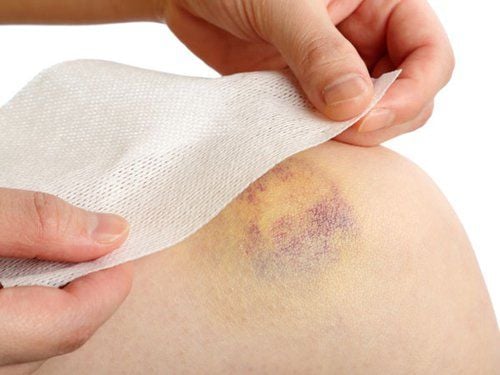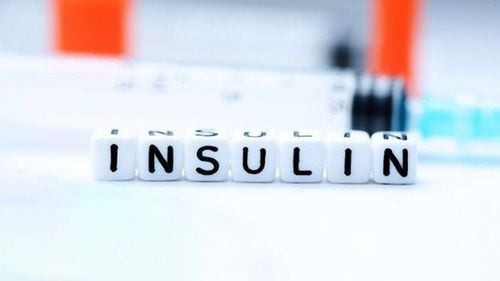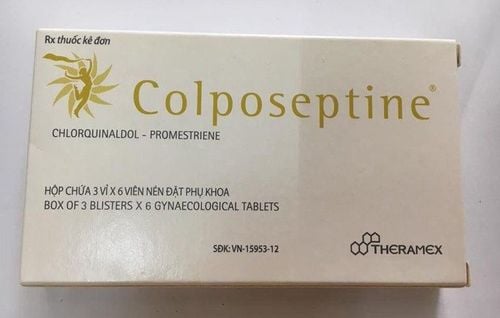This is an automatically translated article.
When accidentally discovered a few bruises on the skin of the arms, legs, thighs ... without the cause, many people think that it is a "grass ghost" shot, a "ghost dog" bite. However, from a medical point of view, when the body often appears bruises on the skin for no reason, this can be a warning sign of health problems.1. What are hemorrhagic bruises on the skin?
A bruise is usually a common skin injury or is the result of the blood vessels that carry blood back and forth between the heart, tissues and organs of the body burst. Broken blood vessels due to injury or weakness cause red blood cells to escape from the vessel wall and degenerate, causing black, yellow, and blue bruises that medically known as hemorrhaging on the skin.
Usually, bruising under the skin will disappear after a few weeks, but this can also be confused with signs of dangerous diseases.
2. Causes of bruises on the skin
Diabetes (diabetes) If the body often appears bruised patches of skin, it can be a warning sign of advanced diabetes. Bruising occurs due to internal capillary bleeding because blood vessels, skin, and nerves are weakened by high blood sugar. This is one of the most common causes of unexplained bruises on the skin.
Excessive exercise Exercise can also cause skin bruising. People who do vigorous exercise and lift a lot of weights can accidentally injure themselves, rupturing small blood vessels that cause bruising. Overtraining in the gym and playing sports with high intensity of activity will cause the body to be bumped and injured, leading to microscopic tears in the muscle fibers, this is the reason for the appearance of scars. bruises.
Aging As we age, the production of collagen in the skin decreases and the protective layer of fat also decreases. After the age of 60, people are often very susceptible to bruises even if they only have a slight impact on the skin.
Blood disorders In hemophilia, blood is difficult to clot and prolonged bleeding, even a slight physical impact can cause bruising of a large area of skin. Unexplained bruises could be a sign of blood cancer or other blood clotting disorders. Therefore, you should see your doctor soon if you regularly see unusual, dense, unexplained bleeding bruises.

Các vết bầm tím trên da do rối loạn máu
Specifically, people with bleeding under the skin will appear many tiny spots and bruises due to blood leaking out of the small capillaries. For people with leukemia and clotting disorders, it can increase the risk of bleeding or forming blood clots and blood clots under the skin, causing the skin to become "less sharp" by bruises.
Drug-induced skin bruising Some drugs if taken a lot such as: aspirin, oral contraceptives, antidepressants, pain relievers, anti-inflammatory drugs, anticoagulants, iron-containing medicines or anti-asthma drugs for a period of time long... can cause the skin to bruise easily.
Purpura In this disease, blood escapes from the tiny capillaries resulting in thousands of tiny bruises. The disease may be accompanied by itching in severe cases.
Vitamin C deficiency Vitamin C plays an important role in wound healing and collagen formation. When the body lacks vitamin C, it will cause small blood vessels to burst, resulting in bruising.
In addition, vitamin B12 deficiency will directly affect blood production, vitamin K deficiency reduces blood clotting, vitamin P deficiency makes collagen production difficult, leading to thin and narrow blood vessels. This results in frequent bruising.
Hormonal imbalance Bruises will not stop appearing if a woman's body is lacking in estrogen (female sex hormone). This causes a significant weakening of the blood vessels and makes the capillaries more susceptible to damage. According to experts, the above hormone imbalance may be due to the fact that women are in menopause, are using hormonal drugs or are pregnant.
3. How to treat hemorrhagic bruises
Apply ice with an ice pack or a bag of frozen vegetables on the affected skin for 20-30 minutes to speed up recovery and reduce swelling. However, do not apply ice directly to the skin, but wrap the ice pack in a towel; Elevate the leg as much as possible during the first 24 hours after the injury if the bruise covers a large area of skin on the leg or foot; Use acetaminophen (paracetamol) for pain relief as directed by your doctor. Avoid aspirin or ibuprofen as they slow blood clotting and can prolong bleeding time; Apply a warm towel to the bruise for 10 minutes or so after about 48 hours of injury, doing it 2-3 times a day can increase blood flow to the bruised area, helping the skin to absorb blood more quickly, darkening will fade.
Please dial HOTLINE for more information or register for an appointment HERE. Download MyVinmec app to make appointments faster and to manage your bookings easily.













